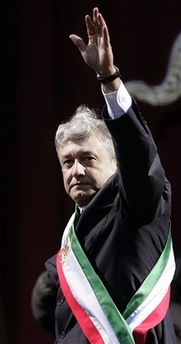Losing candidate names himself 'president'
(Agencies)Updated: 2006-11-21 09:19
Since narrowly losing Mexico's presidential election, Andres Manuel Lopez Obrador has led massive protests claiming that fraud robbed him of victory, begun setting up a parallel government and even named a cabinet.
Based in Mexico City, the parallel government will not try to collect taxes or make laws. It will have one objective to hamper Calderon during his six-year term that begins on December 1. His supporters have pledged to block Calderon's swearing-in ceremony before the Mexican Congress, although they have not announced how they plan to do so.
"We're not going to give the right free rein," Lopez Obrador said in a final stop in the southeastern state of Veracruz this weekend. "We're going to confront it."
According to Lopez Obrador's website, the campaign has opened bank accounts where Mexicans can donate money for his parallel government.
But it remains to be seen whether the man who claims the elections were tainted to favour the rich can keep up momentum.
Besieged by protests since the disputed July 2 presidential elections, many Mexicans are tired of political strife.
The upheaval has taken a heavy toll on the country's tourism industry, one of Mexico's main income generators. According to Mexico Tourism Department, the number of foreign tourists visiting the country between January and September of 2006 was down 4.3 per cent from the same period in 2005.
The US State Department has urged travellers to exercise caution while visiting Mexico and to avoid the southern city of Oaxaca, where a leftist protest not directly related to the presidential dispute has created chaos.
Columnist Rene Aviles called on Calderon to put things in order when he takes office. Outgoing President Vicente Fox has been criticized for his hands-off approach to the conflicts.
"If Calderon wants to govern without so many blunders, he should start with a firm hand," Aviles wrote in the Mexico City newspaper Excelsior on Sunday.
Lopez Obrador also faces a big challenge in uniting his Democratic Revolution Party. Some within Mexico's main leftist party have started to distance themselves from his civil resistance campaign, fearing that they will lose support.
Others say Mexico needs strong action to focus more attention on its millions of poor and Lopez Obrador, a former Mexico City mayor, is the man to do that.
Lopez Obrador's platform resonated with many Mexicans, forcing the business-friendly Calderon from Fox's conservative National Action Party to take note. He has borrowed heavily from ideas in Lopez Obrador's legislative agenda, including calling for universal health care.
The leftist's parallel government "could create the organization that is necessary to steer the country in a new economic direction," columnist Rosa Albina wrote in the Mexico City newspaper Reforma on Sunday.
|
||
|
||
|
|

